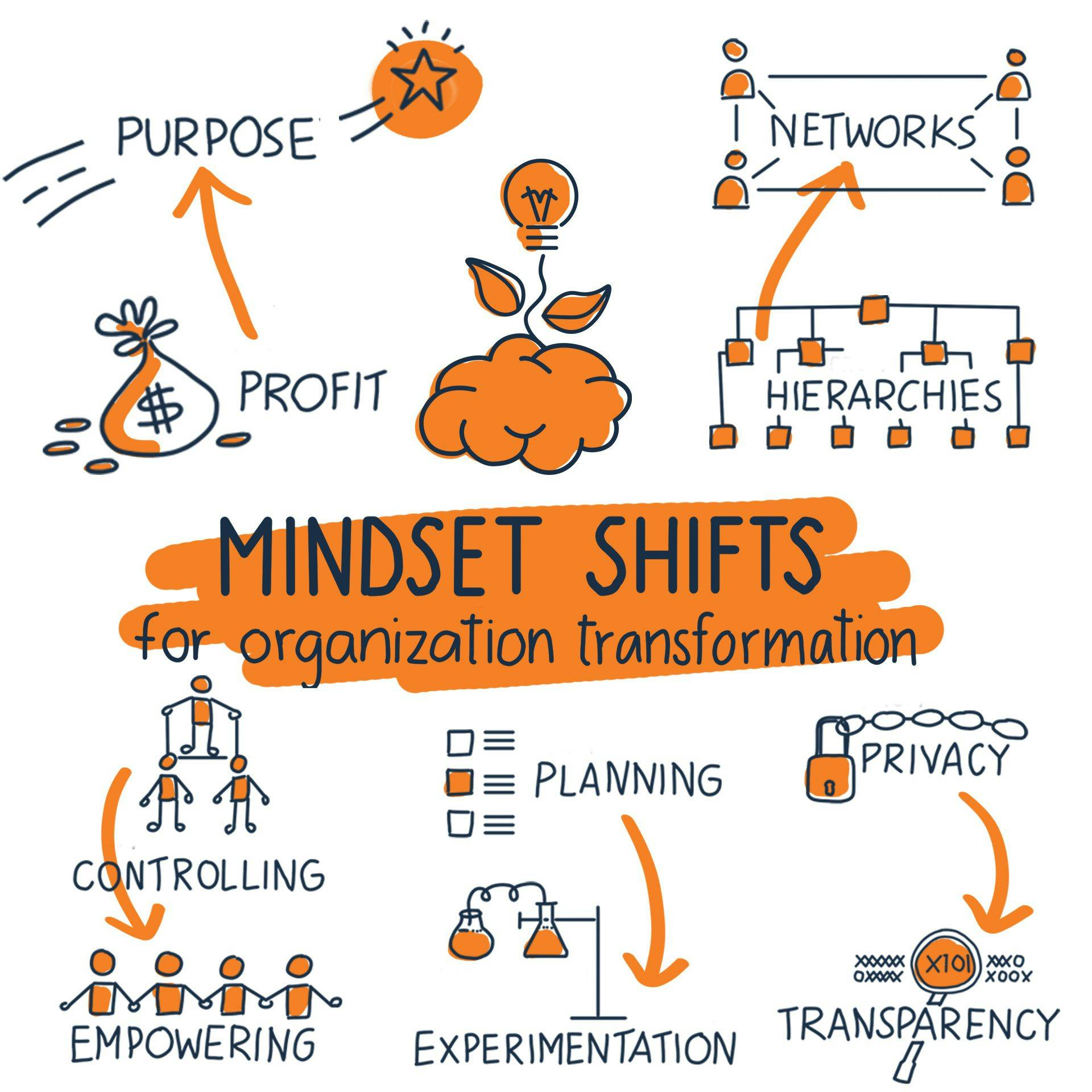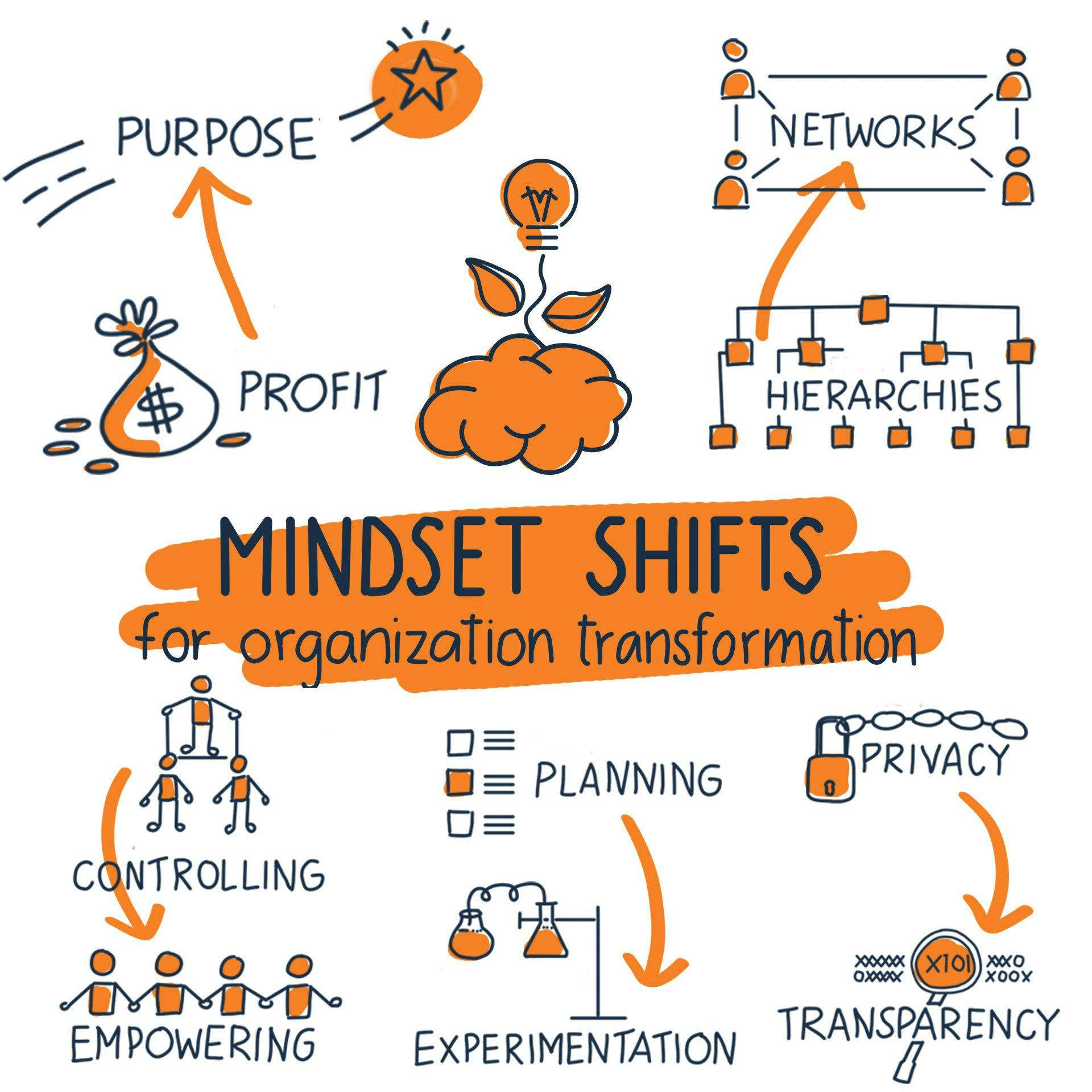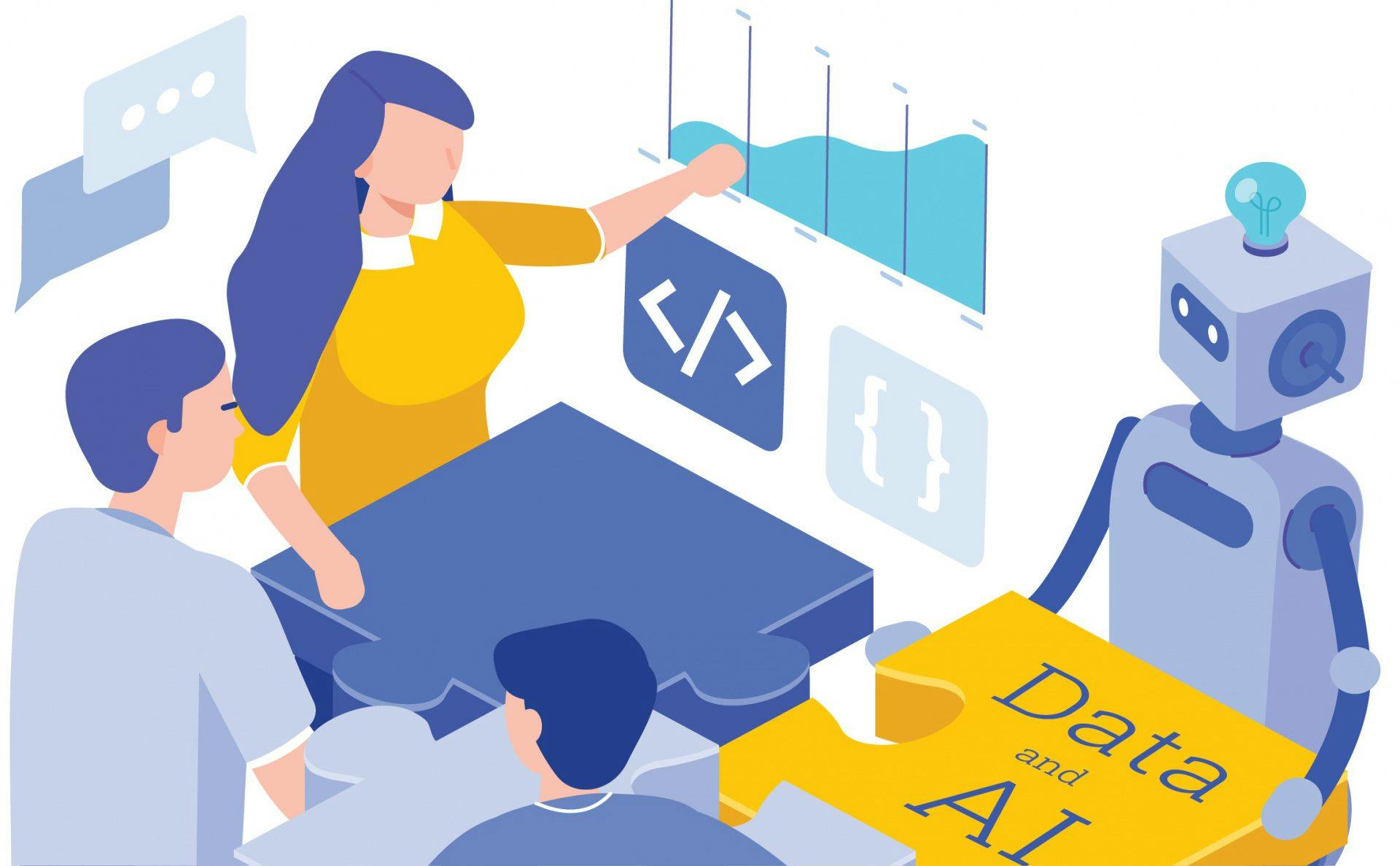Mindset shifts for organizational transformation
Read time: 2-3 minutesFebruary 2021
Everyone wants to become data-driven and most organizations have realized by now that the transition revolves around acquiring the right data, technology, skills, and models. However, executives often seem to ignore the most important, and most exciting requirement: changing the corporate DNA. To facilitate a data-driven approach and to attract the new generation of digital talent, organizations will have to implement multiple mindset shifts. And not all of them are even directly related to data. What they do have in common, though, is that the board has a key role to play. Rianne Langenberg, Managing Consultant at ORTEC Consulting, takes us through several key requirements based on the five “Mindset shifts for organizational transformation’ published by ThoughtWorks. Such a philosophical and organizational shift starts at the top and requires a solid change plan.
This article on Mindset Shifts for Organizational Transformation is the last part of our series on Data and AI in the Boardroom and is powered by Rianne Langenberg, Managing Consultant.

Five essential mindset shifts
To successfully change a business model, one must also change the culture. Many organizations will intuit that something is to be done, but quickly find that it is much easier said than done, resulting in neglect of this part of the transformation process. “Understandably so”, says Rianne Langenberg, “because it’s the most complicated part.” After all, culture is wider than digital culture alone. To continue to work together effectively in a digital environment, the organization’s entire culture must be scrutinized and reviewed, and the board can play a role of major importance. Sachs and Kundu from ThoughtWorks identified five key themes for organizational transformation, all of which are purview of the board. It is up to the board to drive change and set a good example. But it must be willing to experiment in equal measure and remain transparent about its efforts. Besides, the board must have a clear view of its purpose and be able to communicate its objectives.

1. From profit to purpose
The first theme centers on a shift from a traditional focus on profit to emphasizing purpose. Profit is no longer king, says Rianne. “Executives traditionally prioritized maximum delivery of short-term value, but it is now evident that investors and boards are cottoning onto the fact that having a corporate purpose and pursuing long-term success is becoming more important. Therefore, sustainability has become a cornerstone of corporate strategy. This mindset shift has serious consequences for data-driven working, as many organizations currently have a penchant for quantification and express everything in terms of short-term financial value. Shifting to a purpose-oriented approach and emphasizing long-term success will require new metrics. In other words, making the switch to a data-driven approach will also mean letting other data determine their decisions.”
________________________________________________________________________________________________
“New employees need purpose and your organization must be able to meet that need.”
________________________________________________________________________________________________
Rianne believes that purpose is also essential in order to acquire and retain new talent, including digital talent. “In the past, people’s identities were closely tied to their jobs. If you baked bread or sold vegetables for a living, you ‘were’ a baker or a greengrocer. Nowadays, people use their careers to develop and evolve, which is part of the reason they’re changing jobs more quickly. New employees need purpose and your organization must be able to meet that need. Defining a clear purpose can help you give people a place to call home and retain customers in the long term. ORTEC’s partner 510 (Red Cross) is a great example of an organization that uses its purpose to attract lots of talent with data skills.”
For Rianne, purpose is essential for long-term success. “Purpose can also guide you in devising new digital business models or help you assess the feasibility of business cases. A board looking to become purpose-driven will consistently have to look beyond short-term profit alone and clearly communicate its other goals.”
________________________________________________________________________________________________
“The next step is networked collaboration, within and across organizations.”
________________________________________________________________________________________________
2. From hierarchies to networks
The second theme is the shift from hierarchy to broader forms of collaboration. As Rianne sees it, a silo mentality with clearly defined hierarchies is difficult to reconcile with the digital world. “Digitization and data-driven working enable us to take an increasingly holistic approach by offering complete customer journeys, for instance, or providing more comprehensive services. To make this happen, we must transcend departmental or even organizational boundaries. If we employ smart, data-driven models and insights to tackle these issues, we can actually generate more value"
However, this will require cross-departmental or even cross-company cooperation. “In fact, we also experience a shift to multi-disciplinary cooperation”, Rianne adds. “Marketing, customer support, delivery, IT and analytics will all have to join forces to build an integrated customer view. Many companies have already abandoned more functional divisions and have opted instead to work with product or service-oriented teams, combined with secondary functional departments or communities. “The next step is networked collaboration, within and across organizations.” We’re going to start sharing data, find technology partners, create platforms and delve deeper into blockchain.”
A more integrated approach can create significantly more value, says Rianne, “But only if we start working together in networks. Such a philosophical and organizational shift from hierarchies to networks starts at the top and requires a solid change plan.”
________________________________________________________________________________________________
“Empowering your employees will help you point your data-driven
ambitions in the right direction.”
________________________________________________________________________________________________
3. From controlling to empowering
The third mindset shift requires organizations to relinquish control and to give their people the freedom to contribute on their own. According to Rianne, this is a perfect situation for the digital generation, which thirsts for empowerment. “But that’s not the only reason to seriously consider making this shift. Whereas controlling stems from an urge for quantifiability, empowering is about enabling and challenging people to do the right thing. Companies that manage to successfully implement and integrate this shift into their culture can expect to see clear results, as employees will automatically start going the extra mile, focusing much less on their job description and much more on the problems worth solving. Approaching these problems worth solving with smart models will create significantly more value than simply digitizing existing tasks. “Empowering your employees will help you point your data-driven ambitions in the right direction.”
To successfully implement empowerment, a board must clearly define its higher-order goals (see purpose) and organize its people effectively and purposefully (see networks). “However, it will also require executives to change their approach to governance”, says Rianne. “Empowering does not involve abandoning data-driven dashboards. Rather, it means defining other KPIs and targets. Sales targets based on deal value, for instance, are for dinosaurs only.”

Rianne Langenberg, Managing Consultant
"When done properly, nine out of ten experiments will fail."
4. From planning to experimentation
The world is changing so rapidly that organizations are required to undergo virtually constant change. It has become virtually impossible to stick to rigid, predetermined plans. What is more, rigid plans can be hard to adjust. Setting up experiments and determining what will and will not work quickly and efficiently is a much better approach, which is exactly why the fourth theme is “from planning to experimentation”.
"It's a big step, of course," Rianne admits. “Instead of optimizing and anchoring a single process, you have to be prepared for constant change. That doesn’t mean throwing plans completely out the window, but it does involve trading in a rigid approach for one a little more flexible. Proper experimentation is becoming increasingly important. If you have a new technology or new idea for a business model, try it out quickly and implement it right away if it ends up being useful. When done well, this can give your continuous improvement cycle a huge boost.”
A word of warning: this sounds a lot easier than it actually is. “Successful companies, most of which are based online, run thousands of tests a year, whereas most companies only run dozens and create preciously little value. So why are these companies so averse to experimentation? It’s often a cultural issue. When done properly, nine out of ten experiments will fail. In an organization designed to be as efficient, predictable and successful as possible, failing ideas are seen as a waste of time and effort. But you can’t have that killer idea without the other nine that just didn’t cut the mustard.”
To be able to experiment successfully, it should become part and parcel of your daily routine”, says Rianne, “even when the going gets tough. Ultimately, it’s about stimulating creativity and curiosity, about creating a culture in which people feel free to experiment at any time. The other big realization should be that data trumps opinions, even if they’re what the boss thinks. Experimentation is, by its very nature, data-driven, and the reverse is equally true: if you really want to tease value out of a data-driven approach, you will have to experiment.”
________________________________________________________________________________________________
“Boards have to move away from a ‘Because we say so’ attitude
and become more transparent about their considerations.”
________________________________________________________________________________________________
5. From privacy to transparency
Privacy has been, and still is, an important topic for companies, and rightfully so. Simultaneously, the need for transparency is quickly picking up pace, “both among customers and regulators”, says Rianne. "What happens to my data? Where does my product come from? Am I making ethical decisions? Digitization and data-driven working has enabled companies to find better answers to these questions, due in part to new developments surrounding the Internet of Things, blockchain, data integration and data lineage.” That is why the fifth mindset shift is one from “privacy” to “transparency”.
Like customers and regulators, employees also want more transparency, and Rianne believes that meeting these needs can have various benefits for a board. “Boards have to move away from a ‘Because we say so’ attitude and become more transparent about their considerations now that employees expect greater transparency about the board’s intentions. Conversely, the need for transparency also has implications for the use of machine learning & AI. Models now have to be demonstrably explainable and fair (XAI/FAI), which means that data scientists will have to incorporate explainability and fairness in their very design.”
In conclusion
Looking back at the five themes, Rianne concludes: “A data-driven approach stands the best chance of succeeding if you give your employees the right goals (purpose) and foster collaboration (networks), if you enable your employees to identify the problems worth solving (empowering) and constantly challenge them to explore solutions with a fail-fast mentality (experiment), whilst remaining open and honest (transparent) towards your employees, partners and customers.”
About the author
Rianne Langenberg is Managing Consultant at ORTEC. With her broad experience in digital strategy, change management and process design, Rianne is always eager to structure and manage new challenges. She loves to be creative and aims to not just improve, but to renew. Making things better ánd more fun.

Sign up for more thought-provoking insights
Stay current through our Data Brief, delivered to your mailbox once a month.

